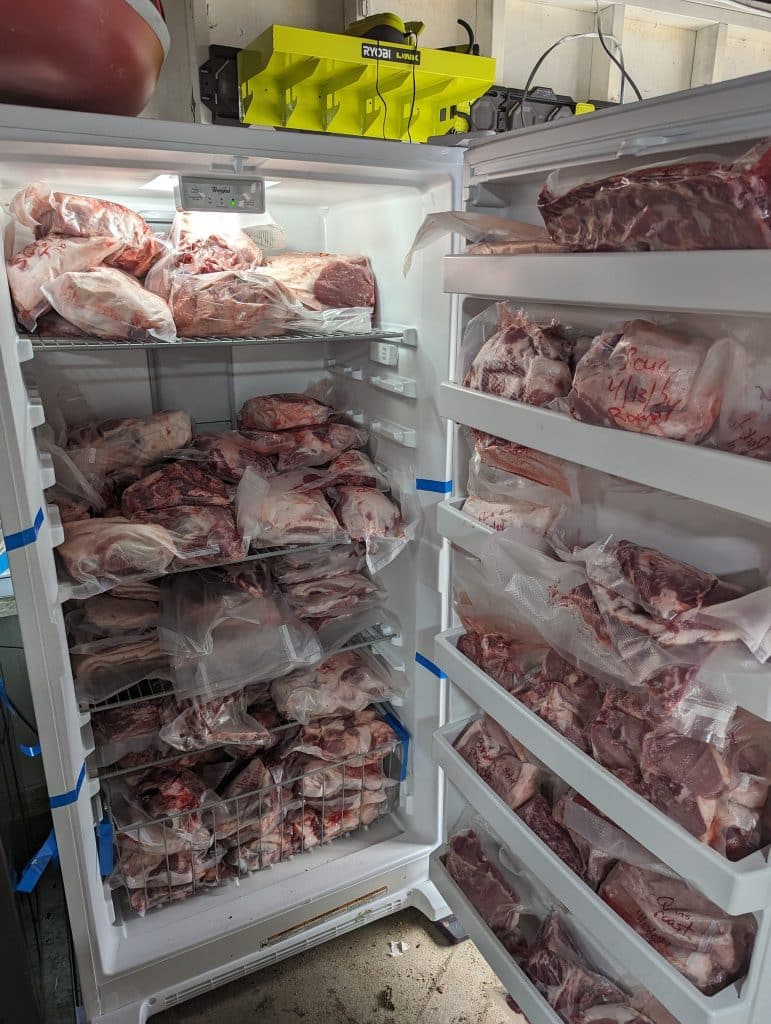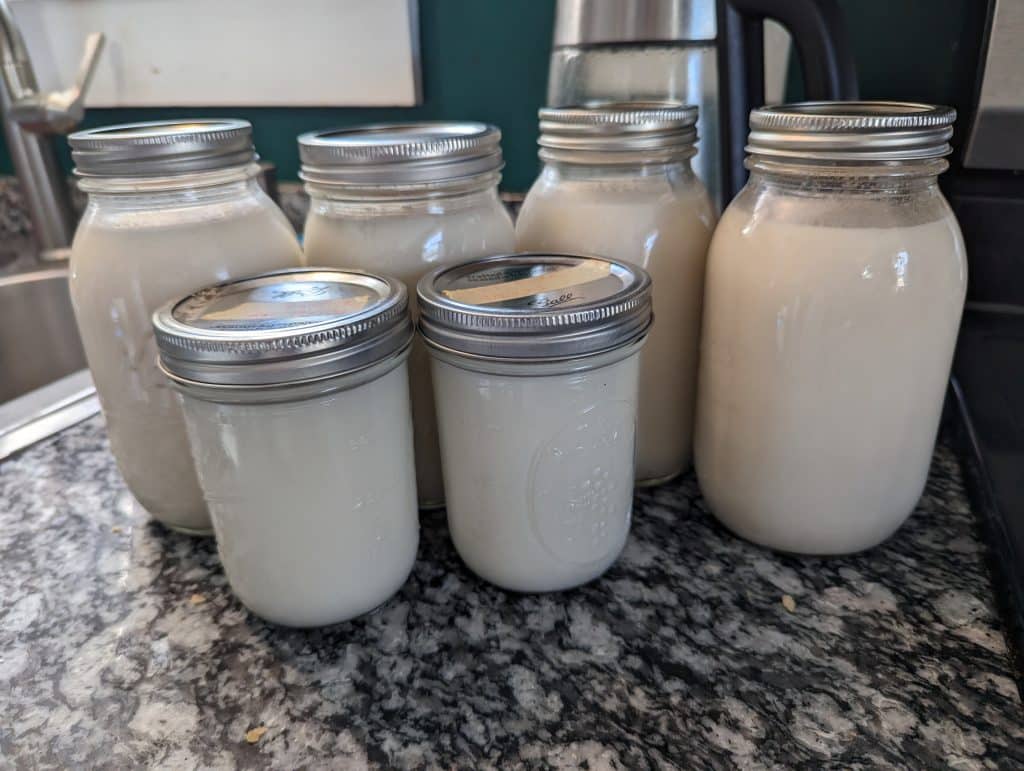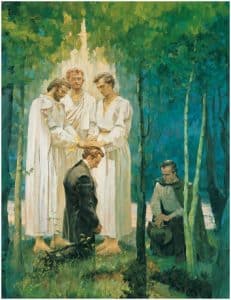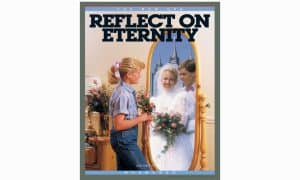We slaughtered two pigs over the weekend on our small hobby farm in New England. Don’t worry, no further details about that.
Our resident expert, veteran of 30+ pigs, ran the two-day operation. From procuring the proper tools to demonstrating the more technical tasks, our fearless leader took a group of newbies and made us an effective team.
Our expert is a small, compact, and impressive woman who, at any given moment, had all the men around her, deferring to her, learning from her, and following her directions. Whether it was an anatomy lesson for interested kids, stepping back to let people clumsily practice new skills, or demonstrating a difficult cut, the depth of experience and wisdom she brought to the process made for a very successful day.

The butchering process took us almost 12 hours. With seven adults and 10 children aged 2 to 11, we had a full house and still needed every helping hand we could get.
Because I didn’t want to become intimately acquainted with butchering, I took on a support role. I managed the kids, including a potty-training toddler and big kids who dug to China when I had them dig holes for our new apple trees. The kitchen had to stay clean and accessible; bowls, soap, and water needed to be procured; towels and rags needed to be washed, and first aid had to be administered (three nips with knives, no maiming).

Then there was feeding the hordes breakfast and lunch, processing the leaf fat to make into pastry lard, vacuum sealing all of the cuts, and the clean up when we finally reached the end of the butchering.
At the end of the day, we all collapsed, but there was pride in that exhaustion, in work done well, and a tangible accomplishment. That night I fell asleep so quickly I didn’t even put my phone on a charger.
The work of any community is bookended by the twin roles of leading and supporting. It’s why the work of care is so integral, especially in partnership with leadership. We needed someone with knowledge and experience to tell us what to do. We needed someone with wisdom and experience to make sure the ship kept running. There is something powerful in both these roles being held by women.
In our little local community, leading and supporting felt circular, equitable. We decided on our ad-hoc roles based on knowledge, expertise, and personal preference. The next time we all come together, maybe to build a fence or plant a garden, we’ll likely juggle our roles to fit the task, our expertise, and personal preferences. Just because I did the work of care this time around doesn’t mean that’s what I’ll do next time.
I can’t help but compare my community experience outside the church to the community within the church, where gender roles are prescribed, hierarchy is top down, and rigid rules govern our practices.
We can do hard work in the church, and I love my small local community of church people as individuals. But what we’re able to accomplish as a local ward is so much smaller, so much less than I think it could be. There are so many unmet needs, so many opportunities that go unrecognized, because our rigid hierarchy and gender roles constrain us.
There is less joy, less pride in accomplishment, less meaning in performing work somehow in the church system. At church, I’m so worried about overstepping that I find myself paralyzed. I’m frustrated by that inertia. I’m never quite sure what sort of tangible outcomes come from all my church labor. I feel resentment in taking on the work of care in a community that prescribes a narrow role for women.
At church, I feel like I must wait to be asked and then only do what I’ve been asked to do. To have an original idea, to want to contribute in a way I’m capable and motivated to contribute to my community, I’d have to get a bishopric member to hear me, see me, understand me, and approve of me. It’s exhausting to even contemplate.
I’m so tired of feeling guilty, for feeling like I’ve stepped out of line, when I do attempt to contribute outside my narrowly prescribed calling. I’m tired of trying to fit in a box that’s too small.
I would like to feel at church like I did over our butchering weekend; that what I contribute matters and that I have the agency to find the right role rather than the prescribed role.
What would our organizations look like without top-down hierarchical practices? What would our organizations be able to accomplish if we could volunteer rather than wait to be called?
The possibilities seem limitless. The opportunities to serve and be served multiplied. And I hope I would fall into my bed asleep so quickly that I would forget to charge my phone.
Photo by Elaine Casap on Unsplash










12 Responses
Thank you so much for this post. It really resonated with me.
Beautiful post! I love the flexibility and fluidity of roles and community that you describe.
I just had a conversation with my best friend who is in charge of the funeral lunches in her SLC ward. She is fabulous and has perfect knowledge of how to provide beautiful meals for the biggest group…she’s a total gem! The RS President decided she herself would make the call on when my friend could have the tablecloths to set the tables…oh, and my friend bought “the wrong kind of ham”… which was by the way…delicious…she is ONE and DONE!!
Oooh that’s frustrating. Leaders who are focused on making space rather than taking up space are far too rare. This RS president learned the lessons of the hierarchy very well and it’s a good reminder that no one is immune.
I guess even sisters can practice unrighteous dominion. The RSP should just be grateful she doesn’t have to do it. Bet she reloads the dishwasher after someone else does it!!
We had a stake RSP a few years ago who refused to make sisters do table cloths. Now we use paper. She also refused to plan big meals for visiting Poobahs. I love the PNW!
Ah. Love this idea of community. What a cool experience (I would be with you, doing anything away from the innards of a creature). I particularly love the idea you present about the difference of CHOOSING the work of care and being forced/limited in it. “I would like to feel at church like I did over our butchering weekend; that what I contribute matters and that I have the agency to find the right role rather than the prescribed role.” Beautiful.
Congratulations on such an incredibly productive day! I grew up on a cattle ranch and have long thought that anyone who eats an animal should at least once in their life witness how it gets to their plate, to have a proper appreciation for that circle of life. Having said that, I would have been with you in the kitchen lol. Amen to every comparison you made about service in the community vs the church.
Hats off to you! It’s hard work. The whole pig experience very much impressed on us the responsibility to give an animal a great, albeit short, life and to practice gratitude and appreciation for the offering. It’s a very symbiotic relationship. I am glad we gave it a go.
What a great example of how the rest of our lives work, choosing and rotating between roles based on talent, experience and preference instead of confined to prescribed gender roles. I sometimes wonder if our male, called-for-life church leaders have been out of the rest of the world so long they have forgotten how women and men with together elsewhere, unfettered by gender roles.
I am not sure if the older called-for-life church leaders had access to experiences were what women and men did wasn’t defined by gender.
In their professional church lives, they would have been used to “supportive women” as secretaries and essentially women middle managers in women-centric fields such as nursing and teaching. In their personal lives, they could have had female specialists such as doctors – but a quick Google search pulls up that there aren’t as many female doctors as there male doctors, and that it looks like Utah’s ratio is 2/3 male doctors to 1/3 female doctors (and Idaho’s ratio is around 3/4 male doctors to 1/4 female doctors). Furthermore, it is likely that the church leaders have support staff (or spouses) who make their doctor’s appointments for them – who could easily avoid picking a female doctor for the church leader because of a pragmatic understanding that “the church leader is more likely to listen to a male doctor”.
I think you are spot on about male church leaders having limited experience in the real world.
What a great way to think about this issue! Love that you connected it to a time when community felt so tangible and necessary. A peak inside many other faiths (and orgs) will show something similar: people showing up with their talents and doing what needs to be done bc they know how and don’t need permission. Our top down approach is not the best or only way to do things.